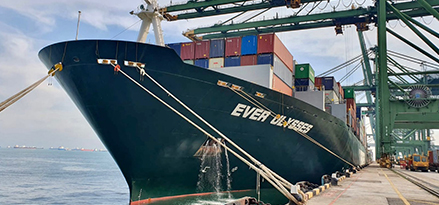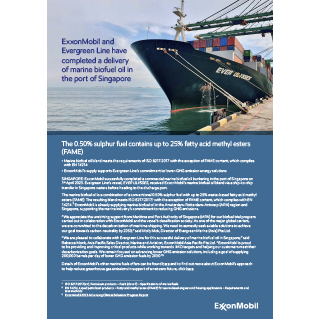

ExxonMobil and Evergreen Line have completed a delivery of marine biofuel oil in the port of Singapore
The 0.50% sulphur fuel contains up to 25% fatty acid methyl esters (FAME)
- Marine biofuel oil blend meets the requirements of ISO 8217: 2017 with the exception of FAME content, which complies with EN 14214
- ExxonMobil’s supply supports Evergreen Line’s commitment to lower-GHG emission energy solutions
SINGAPORE - ExxonMobil successfully completed a commercial marine biofuel oil bunkering in the port of Singapore on 1st April 2023. Evergreen Line’s vessel, EVER ULYSSES, received ExxonMobil’s marine biofuel oil blend via a ship-to-ship transfer in Singapore waters before heading to the discharge port.
The marine biofuel oil is a combination of a conventional 0.50% sulphur fuel with up to 25% waste-based fatty acid methyl esters (FAME). The resulting blend meets ISO 8217:2017,1 with the exception of FAME content, which complies with EN 14214.2 ExxonMobil is already supplying marine biofuel oil in the Amsterdam-Rotterdam-Antwerp (ARA) region and Singapore, supporting the marine industry’s commitment to reducing GHG emissions.
“We appreciate the unstinting support from Maritime and Port Authority of Singapore (MPA) for our biofuel trial program carried out in collaboration with ExxonMobil and the vessel’s classification society. As one of the major global carriers, we are committed to the decarbonization of maritime shipping. We need to earnestly seek viable solutions to achieve our goal towards carbon-neutrality by 2050,” said Molly Mok, Director of Evergreen Marine (Asia) Pte Ltd.
“We are pleased to collaborate with Evergreen Line for this successful delivery of marine biofuel oil in Singapore,” said Rebecca Monk, Asia Pacific Sales Director, Marine and Aviation, ExxonMobil Asia Pacific Pte Ltd. “ExxonMobil is proud to be providing and improving critical products while working toward IMO targets and helping our customers meet their decarbonization goals. We remain focused on advancing lower GHG emission solutions, including a goal of supplying 200,000 barrels per day of lower GHG emission fuels by 2030.” 3
Details of ExxonMobil’s other marine fuels offers can be found here and to find out more about ExxonMobil’s approach to help reduce greenhouse gas emissions in support of a net-zero future, click here.
1ISO 8217:2017(en), Petroleum products — Fuels (class F) — Specifications of marine fuels.
2EN 14214, Liquid petroleum products — Fatty acid methyl esters (FAME) for use in diesel engines and heating applications — Requirements and test methods
3ExxonMobil 2023 Advancing Climate Solutions Progress Report
About ExxonMobil
ExxonMobil, one of the largest publicly traded international energy and petrochemical companies, creates solutions that improve quality of life and meet society’s evolving needs.
The corporation’s primary businesses - Upstream, Product Solutions and Low Carbon Solutions - provide products that enable modern life, including energy, chemicals, lubricants, and lower-emissions technologies. ExxonMobil holds an industry-leading portfolio of resources, and is one of the largest integrated fuels, lubricants and chemical companies in the world. To learn more, visit exxonmobil.com and the Energy Factor.
Follow us on Twitter and LinkedIn.
Cautionary Statement
Exxon Mobil Corporation has numerous affiliates, including ExxonMobil Asia Pacific Pte Ltd, and many with names that include ExxonMobil, Exxon, Mobil, Esso, and XTO. For convenience and simplicity, those terms and terms such as Corporation, company, our, we, and its are sometimes used as abbreviated references to specific affiliates or affiliate groups. Abbreviated references describing global or regional operational organizations, and global or regional business lines are also sometimes used for convenience and simplicity. Nothing contained herein is intended to override the corporate separateness of affiliated companies.